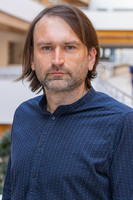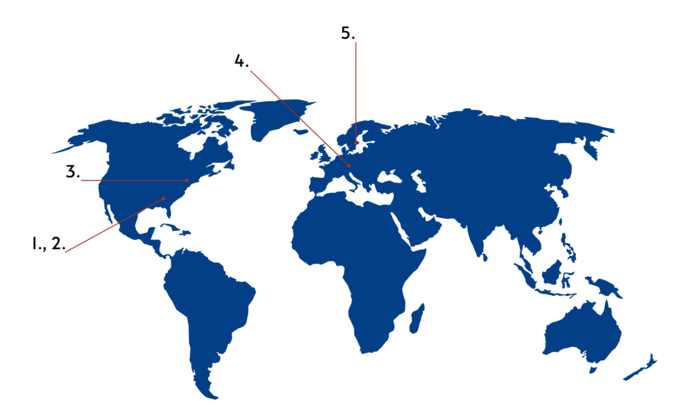Subject Area and Research Team: II. Nucleic Acids Sequencing in analysis of somatic and inherited mutations
Research topics
1. Molecular genetics of neoplasms.
2. Molecular basis of constitutional diseases.
3. Somatic mosaicism in cancer, Alzheimer Disease and other human diseases.
4. Novel biomarkers of cancer development and progression.
5. Molecular genetics of schwannomatosis and neurofibromatosis.
6. Transcriptomic response in regeneration processes.
7. Molecular genetics and transcriptomics of cardiovascular diseases.
8. Genetic screening of the Pomeranian population.
9. Molecular basis of skin diseases.
Coordinators
| Coordinator #1 | Coordinator #2 | Coordinator #3 | |
|---|---|---|---|
| Name and surname |  |
 |
 |
| Academic degree | Prof. Dr. Habil. | Prof. Dr. Habil. | Ph.D. |
| Employment unit | Department of Biology and Pharmaceutical Botany International Research Agenda, 3P-Medicine Laborator |
Department of Biology and Medical Genetics | Department of Medical Laboratory Diagnostics |
| Polish Platform of Medical Research | Prof. Dr. Habil. Arkadiusz Piotrowski | Prof. Dr. Habil. Bartosz Wasąg | Anna Janaszak-Jasiecka, Ph.D. |
| arkadiusz.piotrowski@gumed.edu.pl | bartosz.wasag@gumed.edu.pl | anna.janaszak-jasiecka@gumed.edu.pl | |
| Phone number | +48 58 523 12 99 | +48 58 349 15 31 | +48 58 349 27 92 |
Research Team II. Nucleic Acids Sequencing in analysis of somatic and inherited mutations
Team Members II. Nucleic Acids Sequencing in analysis of somatic and inherited mutations (170 KB)Feel free to contact one of our coordinators to join our Research Team.
Key current projects
1. Identification of the molecular basis of familial hypercholesterolemia.
2. Mutational analysis of the selected solid tumors.
3. Mutations acquired during lifetime that lead to increased risk for human disease, with focus on cancer.
4. Activity Characterization of Alternative Predisposition Loci for Schwannomatosis in SMAROB1/LTZR1 – Negative Cases.
5. Identification and functional evaluation of candidate-mutations associated with genome destabilization in non-cancerous secretory epithelial tissue of mammary gland from patients with breast cancer.
6. Epigenetic and genetic analysis of patients with mastocytosis.
7. Genetic analysis of Pomeranian population.
Key grants
| Funding agency/grant number | Title of the project | Years | |
|---|---|---|---|
| 1. | NCN, OPUS 10, 2015/19/B/NZ5/03510 | Assessment of the activity of selected LDLR gene mutations and identification of novel APOB, STAP1 and LDLRAP1 variants in patients with familial hypercholesterolemia | 2016-2021 |
| 2. | NCN, OPUS 8, 2014/15/B/NZ5/03503 | Analysis of genetic mosaicism in patients with Cornelia de Lange syndrome | 2015-2018 |
| 3. | Foundation of Polish Science | Mutations acquired during lifetime that lead to increased risk for human disease, with focus on cancer | 2018-2023 |
| 4. | NCBiR, 09-0842/ZF18/MPK 503 | Next generation drug delivery systems based on synthetic and recombinant nanobiomaterials (Bionannova) | 2019-2022 |
| 5. | NCN, OPUS 10, 2015/19/B/NZ2/03216 | Identification and functional evaluation of candidate-mutations associated with genome destabilization in non-cancerous secretory epithelial tissue of mammary gland from patients with breast cancer | 2016-2021 |
| 6. | Grant 07-0045 of Polpharma SA, Poland | Importance of epigenetic processes in the pathogenesis of mastocytosis with the hope of finding new therapeutic possibilities | 2018-2021 |
| 7. | NCN, OPUS 10, 2015/19/B/NZ7/03830 | The bioavailability of NO in human endothelium is regulated by microRNA | 2016-2020 |
International cooperation
| Foreign partner (unit name) | Principal investigator(s) | Area of cooperation | |
|---|---|---|---|
| 1. | Heflin Center for Genomic Sciences, The University of Alabama at Birmingham, USA | Michael Crowley | Bioinfomatic analysis |
| 2. | Medical Genomics Laboratory, The University of Alabama at Birmingham, USA | Ludwine M. Messiaen | Molecular genetics of schwannomatosis and neurofibromatosis |
| 3. | Laboratory of Pathology, Center for Cancer Research, National Cancer Institute, Bethesda, USA | Markku Miettinen | Genetics of solid tumors |
| 4. | Department of Immunology, Genetics and Pathology, Uppsala University, Sweden | Jan Dumański | Somatic mosaicism |
| 5. | Johanes Kepler University Linz, Austria | Irene Tiemann-Boege | Application of duplex sequencing in detection of rare variants in breast cancer |

Key publications
1. Lasota J, Chłopek M, Wasąg B, Kowalik A, Christiansen J, Lamoureux J, Kuźniacka A, Felisiak-Gołąbek A, Liu Y, Reyes TAR, Saha R, Agaimy A, Behenska K, Biernat W, Cattaneo L, Centonze G, Daum O, Daumova M, Domagała P, Dziuba I, Geppert CE, Góźdź S, Nasierowska-Guttmejer A, Hałoń A, Hartmann A, Inaguma S, Iżycka-Świeszewska E, Kaczorowski M, Kołos M, Kopczyński J, Michal M, Milione M, Okoń K, Pęksa R, Pyzlak M, Ryś J, Waloszczyk P, Wejman J, Miettinen M. Colorectal Adenocarcinomas Harboring ALK Fusion Genes: A Clinicopathologic and Molecular Genetic Study of 12 Cases and Review of the Literature. Am J Surg Pathol. 2020; 44(9): 1224-1234.
2. Krawczyńska N, Wierzba J, Wasąg B. Genetic Mosaicism in a Group of Patients With Cornelia de Lange Syndrome. Front Pediatr. 2019; 7: 203.
3. Koczkowska M, Krawczynska N, Stukan M, Kuzniacka A, Brozek I, Sniadecki M, Debniak J, Wydra D, Biernat W, Kozlowski P, Limon J, Wasag B, Ratajska M. Spectrum and Prevalence of Pathogenic Variants in Ovarian Cancer Susceptibility Genes in a Group of 333 Patients. Cancers (Basel). 2018 Nov 14;10(11):442. doi: 10.3390/cancers10110442.
4. Mieczkowska A, Schumacher A, Filipowicz N, Wardowska A, Zieliński M, Madanecki P, Nowicka E, Langa P, Deptuła M, Zieliński J, Kondej K, Renkielska A, Buckley PG, Crossman DK, Crowley MR, Czupryn A, Mucha P, Sachadyn P, Janus Ł, Skowron P, Rodziewicz-Motowidło S, Cichorek M, Pikuła M, Piotrowski A. Immunophenotyping and transcriptional profiling of in vitro cultured human adipose tissue derived stem cells. Sci Rep. 2018 Jul 27;8(1):11339. doi: 10.1038/s41598-018-29477-5. PMID: 30054533; PMCID: PMC6063933.
5. Thompson DJ, Genovese G, Halvardson J, Ulirsch JC, Wright DJ, Terao C, Davidsson OB, Day FR, Sulem P, Jiang Y, Danielsson M, Davies H, Dennis J, Dunlop MG, Easton DF, Fisher VA, Zink F, Houlston RS, Ingelsson M, Kar S, Kerrison ND, Kinnersley B, Kristjansson RP, Law PJ, Li R, Loveday C, Mattisson J, McCarroll SA, Murakami Y, Murray A, Olszewski P, Rychlicka-Buniowska E, Scott RA, Thorsteinsdottir U, Tomlinson I, Moghadam BT, Turnbull C, Wareham NJ, Gudbjartsson DF; International Lung Cancer Consortium (INTEGRAL-ILCCO); Breast Cancer Association Consortium; Consortium of Investigators of Modifiers of BRCA1/2; Endometrial Cancer Association Consortium; Ovarian Cancer Association Consortium; Prostate Cancer Association Group to Investigate Cancer Associated Alterations in the Genome (PRACTICAL) Consortium; Kidney Cancer GWAS Meta-Analysis Project; eQTLGen Consortium; Biobank-based Integrative Omics Study (BIOS) Consortium; 23andMe Research Team, Kamatani Y, Hoffmann ER, Jackson SP, Stefansson K, Auton A, Ong KK, Machiela MJ, Loh PR, Dumanski JP, Chanock SJ, Forsberg LA, Perry JRB. . Genetic predisposition to mosaic Y chromosome loss in blood. Nature. 2019 Nov;575(7784):652-657. doi: 10.1038/s41586-019-1765-3. Epub 2019 Nov 20. PMID: 31748747; PMCID: PMC6887549.
6. Forsberg LA, Halvardson J, Rychlicka-Buniowska E, Danielsson M, Moghadam BT, Mattisson J, Rasi C, Davies H, Lind L, Giedraitis V, Lannfelt L, Kilander L, Ingelsson M, Dumanski JP. Mosaic loss of chromosome Y in leukocytes matters. Nat Genet. 2019 Jan;51(1):4-7. doi: 10.1038/s41588-018-0267-9. PMID: 30374072.
7. Dumanski JP, Halvardson J, Davies H, Rychlicka-Buniowska E, Mattisson J, Moghadam BT, Nagy N, Węglarczyk K, Bukowska-Strakova K, Danielsson M, Olszewski P, Piotrowski A, Oerton E, Ambicka A, Przewoźnik M, Bełch Ł, Grodzicki T, Chłosta PL, Imreh S, Giedraitis V, Kilander L, Nordlund J, Ameur A, Gyllensten U, Johansson Å, Józkowicz A, Siedlar M, Klich-Rączka A, Jaszczyński J, Enroth S, Baran J, Ingelsson M, Perry JRB, Ryś J, Forsberg LA. Immune cells lacking Y chromosome show dysregulation of autosomal gene expression. Cell Mol Life Sci. 2021 Apr;78(8):4019-4033. doi: 10.1007/s00018-021-03822-w. Epub 2021 Apr 10. PMID: 33837451.
8. Nedoszytko B, Sobalska-Kwapis M, Strapagiel D, Lange M, Górska A, Elberink JNGO, van Doormaal J, Słomka M, Kalinowski L, Gruchała-Niedoszytko M, Nowicki RJ, Valent P, Niedoszytko M. Results from a Genome-Wide Association Study (GWAS) in Mastocytosis Reveal New Gene Polymorphisms Associated with WHO Subgroups. International Journal of Molecular Sciences. 2020; 21(15): 5506.
9. Janaszak-Jasiecka A, Siekierzycka A, Bartoszewska S, Serocki M, Dobrucki LW, Collawn JF, Kalinowski L, Bartoszewski R. eNOS expression and NO release during hypoxia is inhibited by miR-200b in human endothelial cells. Angiogenesis 2018; 21: 711–724.
10. Kalinowski L, Janaszak-Jasiecka A, Siekierzycka A, Bartoszewska S, Woźniak M, Lejnowski D, Collawn JF, Bartoszewski R. Posttranscriptional and transcriptional regulation of endothelial nitric-oxide synthase during hypoxia: the role of microRNAs. Cell Mol Biol Lett. 2016; 21: 16.